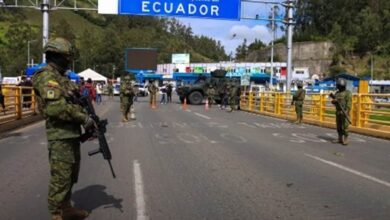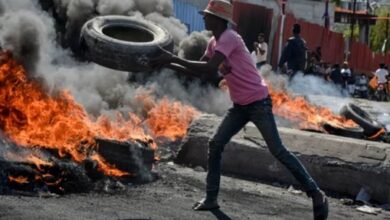Is every migrant a refugee?
Listen to this article
On World Refugee Day, we remember the more than 25 million who are in this condition after left their countries

Four years ago, David * decided to leave Venezuela leaving everything behind, in search of a better life. He arrived in Colombia, and after being in several cities, he settled in Bogotá. His idea was to save money, send it home, where his wife and son were waiting for him, and after a few months, maybe a year, return to his native country. Step by step, their plans changed and their savings were not enough to send what they needed to their family. Today, four years later, he lives with his wife and son in a small apartment in the Colombian capital.
Leer en español: ¿Es todo migrante un refugiado?
Compared to what is experienced now, four years ago the immigration situation was much easier because in recent months the number of people leaving Venezuela to do what David did has doubled. Having arrived at that time, he had the possibility of accessing some documents that the government was issuing to Venezuelans who had arrived before a certain date. Thanks to that, he has had the possibility of obtaining employment, something that not all the 1'300,000 Venezuelans in Colombia have been able to do.
At the time of the conversation, this World Refugee Day was close, celebrated every June 20, reminiscent of the more than 70 million people who have had to leave their countries, by force, because they are in danger due to political differences, racial, religious or social. David reflected on this, that in Colombia and the rest of the Latin American region is booming because of the Venezuelan exodus.
LatinAmerican Post: How is your immigration status? Are you in refugee status?
David: I never had the need to request before the State that I recognized myself as a refugee, so in the punctual sense, I am not [he said while smiling].
LP: In the legal sense?
D: Yes [he explained as his smile faded and his face became a bit more serious and with a frown], I may not be legally recognized in Colombia as one, but I am a refugee. I am taking refuge in this country because of the crisis that my life is experiencing.
The truth is that, as David says, not in the precise sense, but in the broad sense, he could be considered a refugee. According to Decree 1067 of 2015, refugee is any person who "due to well-founded fears of being persecuted for reasons of race, religion, nationality, belonging to a certain social group and political opinions" is outside his country without the possibility of returning or not feel protected by their native country, so they can apply for the protection of the country in which they are.
In fact, of the 70.8 million that Acnur has, 41.3 are considered internally displaced, meaning that they have not left their country, 25.9 refugees in other countries and 3.5 in asylum.
In this sense, what David says makes sense. He arrived in Colombia fleeing his country and its conditions, due to a political regime that has affected the daily life in Venezuela. The problem is that it is necessary, especially in a moment of mass exodus like the one currently lived, that those who feel the need to seek refuge, follow the steps required by the chancery to access those rights and benefits.
Colombia, for example, has created the Route of Attention for Venezuelan Migrants in Colombia, since due to the magnitude of the displacements the government had to create mechanisms specifically for this situation. It guides those who need refuge in the country, giving them the possibility of taking some alternatives to apply for residence permits, like the one David has.
Also read: What are other countries doing regarding the crisis in Venezuela?
In these cases, UNHCR has focused on "ensuring that anyone who has fled their country of origin for well-founded reasons, can exercise the right to request recognition of refugee status, find protection in another country and voluntarily return to their country of origin ", according to the care route. They also provide temporary housing and seek to allow those who do not have legal migration status, who can access basic health and food services, thanks to the support of NGOs.
Peru, on the other hand, is the second country that receives the most Venezuelans and its priorities have been to solve their migratory conditions so that in this way they can take advantage of the economy and strengthen the country, while also trying to solve the humanitarian crisis. For that, they have been granted access to visas or temporary permits, or they have been formalized as refugees so that they can access benefits and their rights.
The issue of Venezuela has been the main one when talking about displacement and massive migrations. Governments, both Colombia and others that have also had to receive hundreds of thousands of people fleeing from that country, have had to create these mechanisms so that the humanitarian situation does not get out of control. However, these migratory situations happen in many parts of the world, and hundreds of thousands of people request before the States, asylum or refuge.
According to UNHCR, 57% of the refugees under UNHCR protection in the world are from Syria, South Sudan and Afghanistan. Although in 2018 there was the largest exponential growth in refugee applications by people from Venezuela, 341,800. Although UNHCR works in many countries of the world and is the main refugee relief agency, there are other governmental, or private, or even religious initiatives that seek to shelter those more than 70 million people affected by alien conflicts.Whether in Syria, Sudan or Venezuela, the governments of neighboring countries, where 80% of the migrants remain, have had to adapt to receive these people without affecting the living conditions of their own citizens.
#WorldRefugeeDay
* David is a fictitious name, used by the person's request.
LatinAmerican Post | Juliana Suárez
Translated from "¿Es todo migrante un refugiado?"





